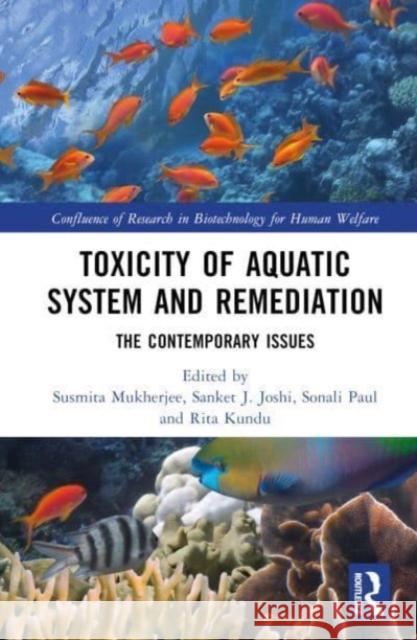Toxicity of Aquatic System and Remediation » książka



Toxicity of Aquatic System and Remediation
ISBN-13: 9781032286662 / Twarda / 2024 / 344 str.
This book includes a discussion on the different routes of contamination, the food-chain transport possibilities of pesticide pollutants, which are very contemporary and required topics of research. It also includes relevant discussions on how to get away with the toxicity.
Wydanie ilustrowane
Impact of microplastics on the environment and its mitigation: a recent review
Bioaccumulation of Cadmium in Fishes of Wetlands of West Bengal and the Effect on Human Health
Aquatic Ecosystem Toxicity and Food Chain
Mercury toxicity in humans: sources, pharmacokinetics, and mitigation measures
Toxic effluents - harmful effects of industries on public health
Toxicity of Surface Water Bodies and Public Health
Anthracene in aquatic ecosystems: A Review
Role of allelochemicals in alleviation of stress in terrestrial and aquatic ecosystem
Comparative assessment of physico-chemical and biological methods for the treatment of sanitary landfill leachate
East Kolkata Wetlands: Unique Case of Treatment of Municipal Wastewater of Kolkata City
Role of Plant Polyphenolic Compounds in Alleviation of Metal Induced Stress in Plants
Aquatic Plant Mediated Bioremediation Strategies
Microbial advancement towards strategic bioremediation techniques: An overview
Microbial Bioremediation: Importance, features, applications, and future perspectives
Mitigation of Metal Induced Stress in Plants with the help of Microbial Association
Potential use of algae and bacteria for bioremediation of waste water: A critical review
Algae as a source of Bioremediation and resource recycling
Blue-green Algae in Waste Water Remediation
Advances in nano-biotechnology for bioremediation applications
Susmita Mukherjee, Professor and Head of the Department, Biotechnology, University of Engineering & Management, Kolkata. She has done B. Sc. & M. Sc. from University of Kalyani, India and PhD from Indian Institute of Engineering Science & Technology, Shibpur, India. Her research interest is on ecotoxicology and environmental remediation. She has worked on the East Kolkata Wetlands, the Ramsar site in West €bengal. Her major work is on arsenic remediation. She has more than fifteen years of teaching experience. Supervised projects as PI. She is Associate Editor of the journal, Applied Biochemistry and Biotechnology, Springer-Nature, Managing Editor of American Journal of Bio-Technology Research, SMART Society, USA. She has acted as guest editor in journals by Springer-Nature, ELSEVIER, Taylor and Frances and edited books published by these publication houses. She has published may research papers in journals of international repute and two patents published.
Dr. Sanket Joshi is a Deputy Director, Oil & Gas Research Center, and an Application Specialist, at Sultan Qaboos University, Oman. He holds BSc and MSc degrees from Sardar Patel University, India, and a PhD degree from M. S. University of Baroda, India – all in Microbiology. Dr. Joshi has 18 years of academic teaching and research experience, and 4 years of industrial R&D experience, in India and Oman. His current research interests encompass: Energy, Microbial products, and Environmental bioremediation. He has 193 scientific publications as papers in international journals (92), book chapters (23), conference proceedings (67), international books (10), and one Australian Innovation Patent to his credit. Dr. Joshi serves as an Academic/Associate/Guest Editor for some of the highly reputed journals. He is book series editor of ‘Advances in Biotechnology and Bioengineering', Elsevier INC. He was awarded the “NRI Senior Scientist Award”, from Microbiologists Society, India, during the academic year, 2019-2020. He has 4153 citations, h-index of 31, and i10 index of 57 (Google Scholar), and was listed among the 2% of the "Stanford University – Elsevier” list of the best scientist in the world-2022, for excellence in scientific research in ‘Energy’ and ‘Biotechnology’ disciplines.
Dr. Sonali Paul is currently Professor, Department of Biotechnology, University of Engineering and Management, Kolkata. Having completed her graduate studies from Presidency College and Masters from University of Calcutta, she completed her doctoral degree from Department of Biochemistry, University of Calcutta. Her present research interests include Environmental Toxicology, Environmental Biochemistry. She has published a number of papers in indexed journals of national and international repute. She has 2 published patents to her credit. She has supervised several projects as a joint supervisor which deals with understanding heavy metal toxicity effects on agricultural as well as medicinal plants and devising methods for remediation. She is serving as an Assistant Editor of International journals and is a member of varied scientific societies.
Prof. Rita Kundu is presently serving as Head and Professor, Department of Botany, University of Calcutta, works in the field of Cell Biology. Her research interest is to study and explore the potential of underutilized/unexplored natural /synthetic organic or inorganic compounds to regulate cell proliferation by inducing cell death either through apoptosis /autophagy /any other way, in cervical cancer cells in vitro. At the same time, she is also interested in identifying the bioactive compounds and their mode of action in regulating cell proliferation. She is also working on cadmium accumulation and it’s amelioration in rice grains. She also works on engineered nanocomposite mediated nutrient delivery and growth enhancement in rice plants to protect soil health due to overuse of fertilizers. She has received financial assistance from UGC, ICMR, WBDBT, WBDST and UGC-UPEII for her research activities. She has published her findings in reputed journals. Till date eight students have submitted their work and eight students are working for the Doctoral degree.
1997-2026 DolnySlask.com Agencja Internetowa
KrainaKsiazek.PL - Księgarnia Internetowa









